Home | Category: Muslim Marriage, Family and Funerals / Arab Life, Marriage, Family and Funerals
GREETINGS IN THE MUSLIM-ARAB WORLD
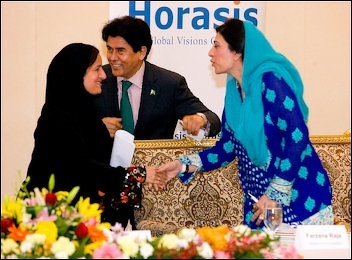
Sheikha Lubna greeting Farzana Raja, at the 2011 Horasis Global Arab Business Meeting
When Muslims greet each other, instead of saying, “good morning” or “hello” they say “As-salaam alaykum,” which means “May peace be upon you and may God's blessings be with you.” This greeting makes a Muslim aware that he has to spread love and peace wherever he goes. [Source: Imam Shamshad A. Nasir cyborlink.com]
People—men and men, women and women, and women and men—often shake hands when they meet. Close friends of the same sex often embrace Arab-style and kiss each other on both cheeks. Knowing some Arabic is always helpful. Arabs. The reply to “As-salaam alaykum” ("Peace be with you") is “Wa alaykum as-salaam wa rahmat Allah wa barakatu” ("on your peace: and the mercy of Allah and His blessings.") [Source: “ Middle East and North African Customs and Manners” by Elizabeth Devine and Nancy Braganti (St.Martin’s Press)]
The greeting of “Assala mualaikum” (“Peace be with you”) used by non-Muslims is sometime greeted with an uneasy silence by Muslims when it is directed towards them. Some Muslims feel the greeting should only used with other Muslims. For Non-Muslim, they often say, “good morning” or “good afternoon” is best.
Women often don't shake hands with strangers. If you are unsure what to do when you meet an Arab or Muslim woman let her make the first move. In some places, good male friends often greet each other by reaching out and shaking hands with both hands, with the right hand placed on top. Sometimes they gently massage each other’s hand, or follow the handshake by placing one hand’s near one’s heart. The duration of handshake tends to be longer than in the West.
Kisses are often given by people who haven’t seen each other for a long time. Greetings are followed by enquiries about ones’ health and family members. Getting straight to the point and getting down to business are regarded as abrupt.
When saying goodbye older people often give each other a kind of salute in which they raise their right hand to their forehead and then place in on their heart. In some Muslim countries, it is customary for people leaving for a long time to kiss the Qur’an held by a family member and pass under it three times. The Final good-bye is preceded by lots of preliminaries. Hosts should always walk their guests to the door.
Websites and Resources: Islam IslamOnline islamonline.net ; Institute for Social Policy and Understanding ispu.org; Islam.com islam.com ; Islamic City islamicity.com ; BBC article bbc.co.uk/religion/religions/islam ; University of Southern California Compendium of Muslim Texts web.archive.org ; Encyclopædia Britannica article on Islam britannica.com ; Islam at Project Gutenberg gutenberg.org ; Muslims: PBS Frontline documentary pbs.org frontline
RECOMMENDED BOOKS:
“Essential Duas in the Life of a Muslim” by Jamiatul Ulama Amazon.com ;
“The Story of the Qur'an: Its History and Place in Muslim Life” by Ingrid Mattson Amazon.com ;
“Unveiling Islam: An Insider's Look at Muslim Life and Beliefs” by Ergun Caner and Emir Fethi Caner Amazon.com ;
“A Muslim Boy's Guide to Life's Big Changes” by Sami Khan and Abia Afsar-Siddiqui Amazon.com ;
“Muslim Woman's Participation in Social Life” by Abd al-Halim Abu Shuqqah and Adil Salahi Amazon.com ;
“A Muslim Life (Following a Faith)” by Cath Senker Amazon.com ;
“How to Pray: A Step-by-Step Guide to Prayer in Islam” by Mustafa Umar Amazon.com ;
“Make Wudu & Salah Like the Prophet, a Simple Step By Step Illustrative Guide” by Shaykh Muhammad S. Adly Amazon.com ;
“Islam Beliefs and Teachings” by Ghulam Sarwar Amazon.com ;
“Islam Explained: A Short Introduction to History, Teachings, and Culture” by Ahmad Rashid Salim Amazon.com ;
“No God but God” by Reza Aslan Amazon.com ;
“Welcome to Islam: A Step-by-Step Guide for New Muslims” by Mustafa Umar Amazon.com
Names, Titles and Introductions in the Muslim-Arab World

chat in Ramallah, Palestine in 1890
Arabs are generally warm and friendly people. Most people address each other on a first name basis, sometimes with a Mr., Mrs., or Miss in front of it or the Arabic equivalent. Professors and doctors are usually referred to by their title with the first name. Haj (masculine) are Haja (feminine) the titles given to people who have completed the pilgrimage to Mecca. Westerners should not use this title. [Source: “ Middle East and North African Customs and Manners” by Elizabeth Devine and Nancy Braganti (St. Martin’s Press)]
When a person is introduced to group for the first time, he or she is introduced to everybody in the group individually. Greetings are often long and elaborate and followed by questions about ones health and family.
When a woman enters a room, men are supposed to stand up. When new guests arrive at a party, every one should stand and greet them. It is customary for guest who just arrived to walk around the room and shake hands with every one. Some people offer their wrists. This dates back to a time when this gesture was used show to that one was unarmed.
Some important titles used in the Muslim and Arab world include: 1) Haj (an honorific that indicates that a person has participated in the Hajj 2) Sayyid (the title given to someone believed to be a descendant of the Prophet Muhammad); 3) “Ma’ ali” (a government minister); 4) “ Sa’ada” (a senior government official); “ Shaykh” for men and “ shaykah” for women (a member of royal family); and 5) “ duktour” for men and “ duktoura” for women (for a Ph.D. or M.D.)
Rules for Non-Muslims in Muslim Countries
Foreigners and local people must abide by Islamic dress codes, abstain from alcohol and pork and observe prohibitions on music and smoking and social customs (do not expose the soles of your feet at people and take things offered to you with your right, not you left, hand). See Prayer Times. Inside their homes Saudis are much more free. They often do things that are supposedly forbidden from doing: watching videos, listening to music, even drinking alcohol.

Saudi Arabia is one of the strictest and most closed societies in the world. Foreigner are expected to follow Islamic customs just as local people do. Things like praying, which are treated lightly in many other Muslim countries, are taken very seriously in Saudi Arabia.
The public profession of all faiths other than Islam is banned. Music, crucifixes, Bibles, books by Jewish authors and other non-Muslim religious texts are also banned. Even thing like nutmeg and vanilla flavoring are banned. The former because it reportedly has hallucinogenic properties and the latter because it contains alcohol. During Ramadan non-Muslims are obligated to follow all of the restrictions and prohibitions that Muslims follow. Non-Muslims who break the rules are routinely sent to prison until the fast is over.
Mosque Customs
Mosques and shrines are often not open to non-Muslims. Those that do welcome them expect them to be appropriately dressed: no shorts, short skirts, revealing halter tops or exposed shoulders. Mosques that allow women often require them to at least wear a head scarf. Some require them to cover their entire bodies, except the face, hands and feet, and not wear trousers. Sometimes mosque provide women who don't have one with a head scarf. Sometimes they have robes for men wearing shorts.
The Muslim faithful are expected to remove their shoes and wash their feet in a sacred basin before they enter the mosque. If no water is available Muslims are supposed to wash themselves with sand. Foreigner visitor's can usually get away with just removing their shoes and are not required to wash their feet. In any case, make sure you feet or socks are clean. Dirty feet in a mosques are regarded as an insult to Islam. In large mosques you remove your shoes and place them on a shelf with a number.
Inside a mosque don't walk in front of someone who is praying, don't touch the Qur’an, never sit or stand on a prayer rug and never place a Qur’an on the floor or put anything on top of it. Also, don't cross your legs in front of an older people and don't step over someone who is sitting down Show respect, remain quiet and stay out of the way. Taking photographs is frowned upon.
It is not unusual for Muslims to be late because the give put getting in their daily prayers priority over getting to an appointment on time. It is also not common for buses, taxis and minbuses to pull off the side of the road during prayer time
Public Customs in the Muslim-Arab World
Never point your shoes or the soles of your feet at someone or touch someone with your shoe. Feet are regarded as the lowest part of the body. To point your foot at someone’s is a great insult. When the Americans captured Baghdad, many Arabs expressed their loathing of the Saddam regime by bashing statues of Saddam Hussein with their shoes. [Source: “ Middle East and North African Customs and Manners” by Elizabeth Devine and Nancy Braganti (St. Martin’s Press)]
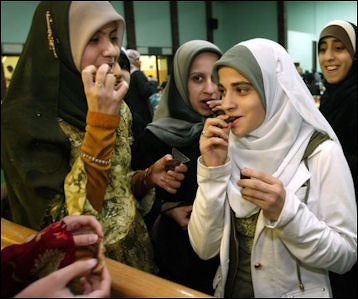
eat with your right hand
Don't blow your nose. When someone sneezes Arabs clasp their hands and bow. This custom back to a time when people believed a sneeze was sign of imminent danger and an indication of the expulsion of a person' vital force.
Inside a mosque don't walk in front of someone who is praying, don't touch the Qur’an, never sit or stand on a prayer rug and never place a Qur’an on the floor or put anything on top of it. Also, don't cross your legs in front of an older person and don't step over someone who is sitting down. Show respect, remain quiet and stay out of the way. Taking photographs is frowned upon.
Eat with your right hand. Also try not accept or give the plates or anything for that matter with your left hand. The right hand is for eating, left for cleaning one's butt. The tradition has its roots in Bedouin customs in an environment without much water. The Qur’an states the right hand is more honorable. Muhammad said: "the best of alms is that which the right hand giveth, and the left hand knoweth not of." Left handers have to learn to use their right hands. Some people keep their left hand behind their back when they eat.
Long lines often form at banks and shops. People sometimes butt in line.
Men and Women Customs in the Arab-Muslim World
The Arab world remains male dominated. If a man and a woman are together questions are usually addressed to the man. Males often shake hands and ignore the woman. In the cities, men and women walk together on the streets and mix freely. In some conservative areas this kind of behavior may be frowned upon. In any case, men and women, even husbands and wives, should refrain from public displays of affection—kissing, hugging, holding hands—wherever they are in the Arab and Muslim world.
Men should never touch women, stare at them or even look them directly in the eye. Women are not supposed to look or smile at men who are not their husbands. Men and men, and women and women, hold hand and walk arm and arm. It is frowned upon for women to smoke in public. Some women smoke in their homes.
The customs involving women are often based on local traditions rather than the tenets of Islam. In social situations, in the presence of men, women are expected to behave demurely and not speak unless they are spoken to. Sometimes a woman will stand behind her husband. If the husband is talking with another man, they will completely ignore her. Many social events are men-only affairs
See Separate Article: WOMEN, MUSLIM CUSTOMS, THE QUR'AN, HADITHS AND SUNNAHS africame.factsanddetails.com
Social Customs in the Muslim-Arab World
Arabs like to talk and use flowery language, elaborate expressions and hyperbole. Conservation is a popular pass time. Men like to sit around together at tea houses and cafes, talking. Women often sit around chatting with their children and with friends at their homes. Discussions can get heated and last for hours. What may sound like shouting and arguing is simply people talking in a normal tone of voice. [Source: “ Middle East and North African Customs and Manners” by Elizabeth Devine and Nancy Braganti (St. Martin’s Press)]
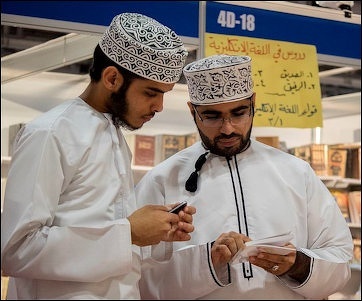
Arab men are often very close together when they talk and look each other directly in the eye and frequently touch one another. This makes some foreigners feel uncomfortable. Even so, foreigners should try not to back away if away they can help. If they do they might be perceived as rude. Foreign men should not look Arab women directly in the eye.
Socializing among men often revolves around smoking and drinking tea. Cigarettes are offered as a sign of hospitality and friendship. If you have cigarettes you are expected to offer them to others. It is considered somewhat impolite to refuse a cigarette but these days most Arabs realize that smoking is frowned upon in the West and accept a refusal by foreigners.
Arabs have a different sense of privacy that Westerners. People are expected to not want to be alone. Many social events are men-only affairs When you arrive at a party shakes hands with everyone who is there. If another guest arrives make sure you are standing to greet them.
Never point your finger or feet at someone. It is sometimes regarded as rude to cross your legs in front of someone.
Conversations in the Muslim-Arab World
Common conversation topics with foreigners include sports, food, television shows, movies, places in Arab world, areas abroad that your friends have visited, history, and families. A favorite topic among women is their sons. They also enjoy clothes, fashions. Although Arabs often talk among themselves about Islam, women, politics, their governments, Israel, the Palestinian issue, and wars involving Arab world, foreigners should avoid talking about these topics with Arabs. [Source: “ Middle East and North African Customs and Manners” by Elizabeth Devine and Nancy Braganti (St. Martin’s Press)]

In many parts of the Muslim world it is difficult to have a conversation with someone without frequent references to God and Islam. Inshallah” (“it is God's will”) and “Praise Allah” are responses to almost everything and appear repetitively in satements. Don’t say anything bad about God and Islam. Don’t admit you are an atheist or agnostic if you are one.
People often ask personal questions first thing, like “are you married?” “How much do you make?” This is often done to size you up, not so much to pass judgement but rather to know how to address you properly and use the correct titles, terms of respect and language. Don’t do the same in return. Don’t ask personal questions when you first meet somebody; don’t refer to a man’s wife unless you know him well.
Arabs often adjust their voices to the situation, speaking softly in one-on-one meetings and shouting to be heard when there are lots of people around. Some have the habit of repeating themselves often and sometimes regard people who don’t repeat themselves as insincere. Arabs are also big on making long speeches and interrupting others.
Don’t say anything that might be perceived as an insult—even teasing or sarcasm—it may cause a loss of face of a loss of honor. Don’t say anything negative about the leaders or royalty in the country you are visiting. Don’t mention sex or make any sexual jokes. Don’t take personally attacks on the United States, the U.S. government or U.S. policy.
Arab Gestures
A person who hold up his right hand and twists it back and forth is saying "I don't understand," or “What does that mean?” In some places, shaking the head from side to side (which means no in the West) can mean the same thing or “What, I didn’t hear you” or “What’s the matter?”.
No can be expressed several ways: 1) by raising the eyebrows, moving the head back slightly and going "tsk, tsk"; 2) moving the head back and jerking the chin upwards; and 3) moving the head back and clicking the tongue. If someone holds up their right forefinger and moves it from left to right it is an emphatic “no” or means “never, never.”

an obscene gesture in some Arab countries
If a person holds up his hand with his thumb and fingers together it means “Wait a minute.” If he holds his right hand with the palm facing up and opens and closes his hand it means “come here.” To beckon someone, move all the fingers of your hand towards. Don’t do the same thing with your forefinger. That is the way to summon an animal. If a person holds his down and flicks the fingers forward it means “go away.” The gesture with palm up and all five fingertips touching each other means “be patient” in much of the Middle East.
If a person stretches out a hand and flicks the wrist it means "what do you want" or "what's up." If he hold out his right hand with the palm up and moves it up and down slowly, it means “be quiet.” The Islamic sign of victory is a right fist with a raised forefinger, the Western No. 1 sign.
When a person raises their right hand to their forehead and then places in on their heart it can mean good-bye or no thank you. When offered something, a right hand over the heart means "no thanks." When offered more tea, a right hand over the cup means "no thanks." . Never point your finger or feet at someone. It is sometimes regarded as rude to cross your legs in front of someone. Some say the thumbs up sign is obscene. It generally isn’t. It means the same thing as does in the West—“very good.” If a policeman or official makes a line across your palm with his index he is asking you for your passport or other documents.
Home Customs in the Muslim-Arab World
In the Middle East and Arab and Muslim world, homes are regarded as a kind of private sanctuary. It is considered an honor to be invited to someone’s house. People are not supposed drop by or to look in the homes of other people unless they are invited. But friends and relatives often drop by unannounced. This often done in the late afternoon or evening. Don’t visit between 2:00pm and 4:00pm. People are often taking a nap around that time. [Source: “ Middle East and North African Customs and Manners” by Elizabeth Devine and Nancy Braganti (St. Martin’s Press)]
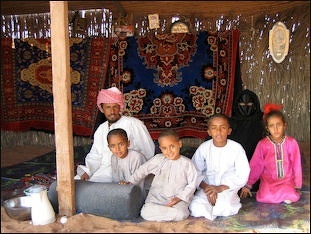
People often sit on the floor, on carpets, surrounded by pillows. Men often sit cross legged or with their legs to the side. Women are often expected to kneel Japanese-style with their legs under them, or their legs to the side or in another position, making sure that a long skirt or another covering covers their legs and feet. Make sure you don’t point the soles of your feet at anyone.
Always enter a home a with your right foot first. People in some Arab countries remove their shoes before entering a home. Sometimes they remove them before entering an office. Muslims are expected to carefully wash before and after every meal. Men often wear their headgear inside.
If you are invited to someone's house of to a meal, bring a gift. Fruit, flowers, a desert, candy for children, house plants, books, games, something small from your home country is fine. Don't bring alcohol. Remember to give or receive a gift with two hands. Gifts are often accepted and opened later in private.
Hospitality in the Muslim World
Muslims have a "powerful hospitality instinct." They consider hospitality to be their sacred duty and guests are honored and held in the highest regard. Any traveler or stranger, even a non-Muslim or an enemy, is considered to be "the guest of Allah," and should treated accordingly. A man who has eaten his host's bread and eaten his salt may claim sanctuary for three days.
Hospitality is expressed with warm welcomes and giving guests the place of honor at the table. Hosts are expected to be totally selfless and offer everything they have. Sometimes foreigners are welcomed into homes of even the poorest families and treated to a feast with the head of the household while other members of the family just look and watch. Sometimes a family will stretch their resources and slaughter a sheep. The British traveler and diplomat Freya Stark wrote that “Years of Arab courtesy spoil us for the rough and tumble of the Western World.”
The tradition of hospitality originated with Bedouins in the desert. Visitors were rare and they are always welcomed and offered food and drink. Travelers in the desert depended on others for food and protection. The reasoning went that if someone helped them they should help someone else. In villages there are special guest houses for visitors. In the cities, displays of hospitality are often a sign of status.
The Qur’an says: "Whoever believeth in God and the Hereafter (i.e Muslim) must respect his guest: and whoever believeth in God and the Hereafter not incommode his neighbors; and a Muslim must speak only good words otherwise remain silent." To get hospitality you can say “ Ana dheef Allah” ("I am a guest of God"). To refuse an offer is regarded as an insult. If you do it try to seek hospitality somehow do it as diplomatically as possible and provide your potential hosts with away to save face.
Hospitality obligations often have priority over time concerns. This means that an Arab man may spend hours drinking tea and coffee and eating food with a stranger and show up late or miss and appointment with friends.
Sunnah on Hospitality
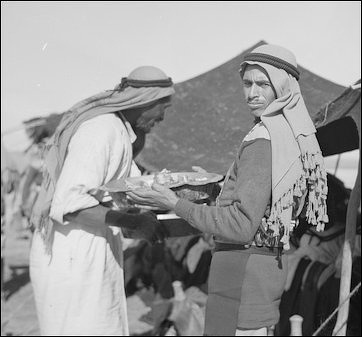
The Sunnahs are the practices and examples drawn from the Prophet Muhammad's life. Along with the Hadiths they are the most important texts in Islam after the Qur’an. They must adhere to a strict chain of narration that ensures their authenticity, taking into account factors such as the character of people in the chain and continuity in narration. Reports that fail to meet such criteria are disregarded.
The Sunnah reads: “When a man cometh into his house and remembereth God and repeats his name at eating his meals, the devil saith, to his followers, "Here is no place for you to stay in tonight, nor is there any supper for you." And when a man cometh into his house without remembering God's name, the devil saith to his followers, "You have got a place to spend the night in." [Source: Charles F. Horne, ed., The Sacred Books and Early Literature of the East, (New York: Parke, Austin, & Lipscomb, 1917), Vol. VI: Medieval Arabia, pp. 11-32]
“Whosoever believeth in God and the day of resurrection must respect his guest, and the time of being kind to him is one day and one night, and the period of entertaining him is three days, and after that, if he does it longer, he benefits him more. It is not right for a guest to stay in the house of the host so long as to inconvenience him.
“I heard this, that God is pure, and loveth purity; and God is liberal, and loveth liberality; God is munificent, and loveth munificence: then keep the courts of your house clean, and do not be like Jews who do not clean the courts of their houses.
Bedouin Hospitality
Bedouins (Middle Eastern desert nomads) have traditionally lived in the arid steppe regions along the margins of rain-fed cultivation. They often occupy areas that receive less than 5 centimeters of rain a year, sometimes relying on pastures nourished by morning dew rather than rain to provide water for their animals.
Bedouins are expected boil their last rice and kill their last sheep for feed a stranger. Whenever an animal is slaughtered for a guest it is ritually sacrificed in accordance with Islamic law. It is customary in some Bedouin tribes for a host to smear blood from a slaughtered animal onto of the mouth of his guest in a show of hospitality.
Hospitality is regarded as an honor and a scared duty. Visitors who happen by are usually invited to sit and share a cup of thick, gritty coffee. Guest are ritually absorbed into the household by the host. If a conflict occurs the host is expected to defend the guest as if he were a member of his family. One Bedouin told National Geographic, "Even if my enemy appears at this tent, I am bound to feast him and protect him with my life."
Image Sources: Wikimedia, Commons except McDonald's Mvslim
Image Sources: Wikimedia Commons
Text Sources: Internet Islamic History Sourcebook: sourcebooks.fordham.edu ; Arab News, Jeddah; “Islam, a Short History” by Karen Armstrong; “A History of the Arab Peoples” by Albert Hourani (Faber and Faber, 1991); “World Religions” edited by Geoffrey Parrinder (Facts on File Publications, New York); “Encyclopedia of the World’s Religions” edited by R.C. Zaehner (Barnes & Noble Books, 1959); Metropolitan Museum of Art, Encyclopedia.com, National Geographic, BBC, New York Times, Washington Post, Los Angeles Times, Smithsonian magazine, The Guardian, Al Jazeera, The New Yorker, Time, Newsweek, Reuters, Associated Press, AFP, Library of Congress and various books and other publications.
Last updated April 2024
